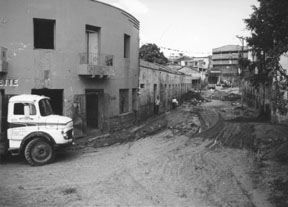|
The Honduran government is selling off indigerous land
By Kari Lydersen
Chicago
For
years, the Honduran government has eyed the country's beautiful coastal
land, imagining the foreign money that could be lured in through tourist
and residential developments. But laws preventing the sale of indigenous
land so far have kept the government from making much profit. The coasts
are home to many of the country's indigenous peoples, and have been protected
by agrarian reform laws in the Honduran Constitution, which prohibit the
sale of indigenous lands and foreign ownership of lands within 25 miles
of the coast.
|
|
|
Devastation
from Hurricane Mitch gave the Honduran government an excuse to
revoke indigerous rights. |
Then in 1998, Hurricane Mitch swept across Honduras, leaving more than 5,000 dead and 2 million displaced--one-third of the country's population. But the devastation gave the Honduran government the perfect excuse to override the constitution and put indigenous lands on the market.
In a middle-of- the-night congressional session on Nov. 30, 1998, with a curfew imposed and the country in chaos, Congress voted to repeal the article that had prevented the sale of coastal lands. They explained that this was necessary to attract the foreign investment needed to rebuild the country.
Indigenous groups were outraged. The Honduran Black Fraternal Organization released a statement noting that the reform would allow privatization of the coastal lands and beaches, including scenic tropical islands, keys and reefs. For tourism projects to move forward, the group reasoned, the indigenous people who have lived there for years would have to be removed.
Even before the hurricane, the vast majority of Hondurans lived in abject poverty. Mitch exacerbated the problem, causing well over a billion dollars in damage. Although $600 million in foreign aid flowed in after the storm, indigenous and poor people have yet to see much in the way of relief. A report this fall in NACLA Report on the Americas documented how high-ranking politicians used relief aid to enrich themselves and their friends. According to the magazine, "One foreign diplomat referred to the rebuilding efforts as a 'feeding trough for public officials.' "
"It's unclear how much money is going to the people and how much is going right into the rulers' pockets," says Vicky Cervantes, a Chicago resident who helped organize a national Pastors for Peace delegation to Honduras. "Many indigenous people say all they've gotten are some clothes or a sack of corn."
For the constitutional repeal to become law, it must pass a second congressional vote. Last summer, the second vote failed, but Congress likely will schedule a new vote. Regardless, the government already has gone ahead with land sales and privatization, gutting a number of peasant and indigenous land protections.
The people protected by these laws include the Garifunas, 150,000 black Hondurans descended from slaves who have lived on the Atlantic coast for more than 200 years. Private mansions in gated, guarded complexes already have been built on their land and construction of hotels is in the works. According to Alexy Lanza, a Chicago-based organizer who visited Honduras last year, illegal development started prior to Mitch, and the hurricane provided the government with an excuse to speed up the process. "If the government doesn't end up getting the repeal, they will keep doing this anyway," Lanza says. "If the indigenous communities are standing in the way of the development they want, they will get rid of them one way or another."
The Honduran government has made overtures to indigenous groups, asking for input on land sales and relocation, but indigenous leaders are unimpressed. Just last summer, the government promised to include the Garifunas and other groups in discussions about land reform, but then ignored their demands for input on which lands are sold, who profits and what happens to the people who live there.
Indigenous groups say resistance to land reform has played a part in increased repression. Numerous protests have been met with government opposition and threats. Last year, the U.S. Embassy in Honduras denied a visa to indigenous leader Salvador Zuniga, who was planning to meet with non-governmental organizations here. The U.S. government claimed that he lacked sufficient evidence of Honduran community involvement to show he wasn't an illegal immigration risk. Less than a month after being denied the visa, Zuniga was sentenced to four years in prison for slandering Honduran Vice President William Handal, whom he had accused of environmental degradation.
One indigenous rights group, the Coordinated Black Organizations of Honduras, is now planning to sue the government, claiming genocide on grounds that the loss of their land would wipe out indigenous culture. "Neoliberalism and powerful economic sectors are condemning our country to death," reads a statement from The Confederation of Autonomous Communities of Honduras, another indigenous group. "It is inconceivable that after the damage from such a brutal phenomenon as Mitch, they are approving laws against nature."
|
In These Times ©
1999
Volume 24, Number 3 |

